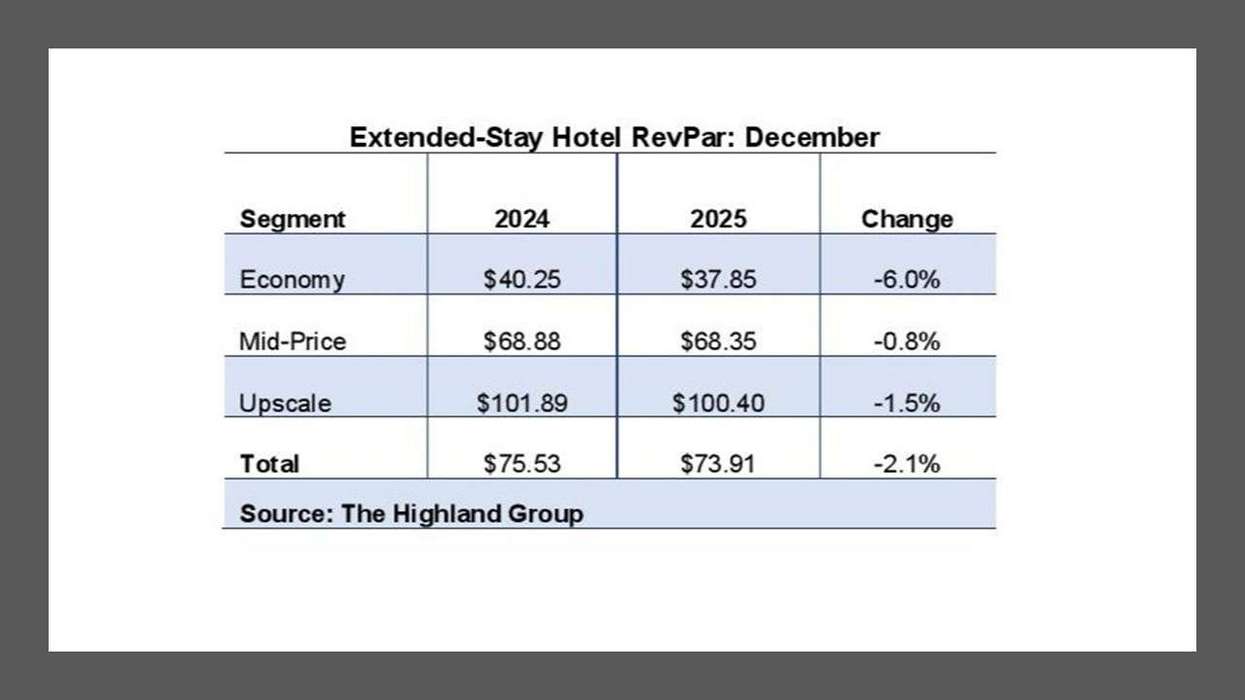WHILE THE LITTLE signs of recovery the U.S. hotel industry had been experiencing recently may be on hold as a result of a recent surge in COVID-19 cases, eventually it will happen, according to an outlook from CBRE Hotels Americas Research. The outlook spells out how that recovery will transpire for each type of hotel and their location.
The hotel and retail markets together provide a strong indicator of economic health, said Richard Barkham, CBRE global chief economist and head of Americas Research, in the outlook and in CBRE’s “Weekly Take” video series. Hotels show market changes most quickly among commercial real estate assets because occupancy can change overnight.
“By this measure, a promising recovery has begun to plateau due to the resurgence of the virus in parts of the U.S. Momentum could be further derailed at any time,” Barkham said. “For the time being, the industry appears to be past the worst fallout from the crisis. We think the current flare up will be contained without too much damage to the economy, but the downside risks are rising. Either way, it will take a further 36 months for the sector to return to pre-crisis performance levels.”
Overall, CBRE forecasts a strong recovery for U.S. hotels in 2021 and 2022, with RevPAR climbing back to pre-crisis levels by 2023.For the rest of this year, CBRE anticipates a 52 percent decline in RevPAR and average occupancy of just 41 percent, down from 66 percent in 2019. Its 2021 forecast calls for a 1.1 percent decline in room supply, roughly 60,000 rooms, as a result of hotels closing permanently or being converted to other uses.
CBRE places the low point of the crisis at April 17 when occupancy stood at 22 percent. It had risen to 46 percent by July 15. STR reported that week-to-week gains the industry had been seeing since April flattened after the July 4 when the effects of the COVID-19 surges began to be felt.
The breakdown of recovery by hotel types and locations are:
Urban Hotels: This is one of the hardest hit of hotel segments because of its reliance on corporate travelers, groups and international travelers, each of which has shrunk significantly during the pandemic. A quarter to half of urban hotels in major markets closed and their RevPAR for the first half of this year will be less than half of last year’s level.
Suburban Hotels: The prevalence of select-service and lifestyle brands and extended-stay hotels has provided some insulation for the suburban market. Extended-stay has been particularly resilient because they cater to contract workers and infrastructure-construction crews, according to CBRE.
Airport hotels: Like urban hotels, the decline in travel has hit this segment hard. Its occupancy was down 70 percent in April from a year earlier and down by 50 percent in June. Businesses’ use of virtual meetings and working from home over in-person conferences has further hampered this segment’s recovery in its early stages.
Interstate Hotels: One of the strongest segments during the pandemic, hotels on interstates benefit from travelers headed to drive-to destinations for summer vacations as well as providing temporary residence for locals and infrastructure-construction workers. As a result, CBRE foresees an average RevPAR decline for interstate hotels of only 29 percent this year, much less than for other segments.
Resort Hotels: Resorts in drive-to markets have been buoyed of late by summer leisure travel. Whereas U.S. resort hotels saw a significant decline in RevPAR in the first quarter, they bounced back stronger than any other segment in the second quarter. On the downside, fly-to markets like Oahu still are suffering greatly.
“Hotels, like other industries, will need vaccines to emerge in order for conditions to begin to return to normal,” Barkham said. “In addition, most hotels specialize in serving business travelers and groups. That business won’t return en masse until job growth resumes, business and consumer confidence perks up, and infection rates are on a sustained decline.”





